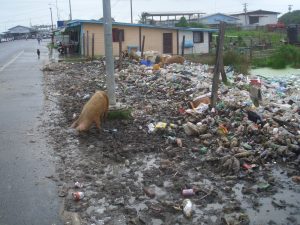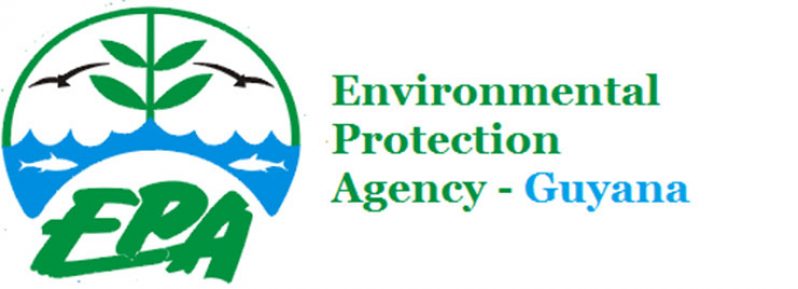ON THE first Monday of October, the international community observes World Habitat Day to reflect on the state of towns and cities and the basic right for adequate shelter. Each year, one unifying theme is chosen with the focus this year being Municipal Solid Waste Management. This calls for cities to become “Waste-Wise Cities.” The United Nations’ Sustainable Development Goals (SDGs), along with the Paris Agreement and the New Urban Agenda, addresses the key issue of solid waste management. The target of Sustainable Development Goal 12 is Sustainable Production and Consumption with an emphasis on environmentally sound management of all waste through prevention, reduction, recycling, reuse and the reduction of food waste.
Guyana, like many developing countries, has long struggled with creating systems to ensure proper disposal of its solid waste. This is directly linked with budgetary constraints, old and inefficient equipment and a lack of reliable transportation to dispose of waste.
In Guyana, the current means of disposal is through legal and illegal dumping and burning; however, these means of garbage disposal have adverse effects on the environment. For decades, communities have grown used to burning their household garbage. It is common to see household after household burning piles of garbage on Sunday afternoons. Although this is the cheapest way to remove garbage, this method creates significant harm to human respiratory health, and equally, it causes environmental harm since it releases gases such as carbon dioxide which contribute to climate change.
GREEN STATE DEVELOPMENT STRATEGY (GSDS)
 As Guyana approaches its Green State Development Strategy (GSDS), it is important to remember that the SDG guidelines call for the integration of actions to end poverty, protect the planet and ensure that all people enjoy peace and prosperity. Alongside the Ministry of Communities, a comprehensive, economically viable, bio-friendly initiative was rolled out to address solid waste management in Guyana. The strategy covers a broad spectrum of waste including residential, commercial, industrial, scrap metal, those produced by healthcare facilities, discarded oils and electrical and electronic refuse. The Ministry of Communities has noted that by 2024, 40 per cent of all generated waste will be recycled, composted or otherwise put to use. The plan will also guide the government’s agenda on collection, transportation and disposal improving the waste management infrastructure, enforcing existing legislation and promoting the waste to energy initiative. In addition, the Solid Waste Management Bill proposed the establishment of a Solid Waste Management Authority (SWMA) which would be expected to function as a corporate body under the Ministry of Communities. This authority would provide oversight functions as well as coordinate all policy, operational and licensing aspects of solid waste management in the country.
As Guyana approaches its Green State Development Strategy (GSDS), it is important to remember that the SDG guidelines call for the integration of actions to end poverty, protect the planet and ensure that all people enjoy peace and prosperity. Alongside the Ministry of Communities, a comprehensive, economically viable, bio-friendly initiative was rolled out to address solid waste management in Guyana. The strategy covers a broad spectrum of waste including residential, commercial, industrial, scrap metal, those produced by healthcare facilities, discarded oils and electrical and electronic refuse. The Ministry of Communities has noted that by 2024, 40 per cent of all generated waste will be recycled, composted or otherwise put to use. The plan will also guide the government’s agenda on collection, transportation and disposal improving the waste management infrastructure, enforcing existing legislation and promoting the waste to energy initiative. In addition, the Solid Waste Management Bill proposed the establishment of a Solid Waste Management Authority (SWMA) which would be expected to function as a corporate body under the Ministry of Communities. This authority would provide oversight functions as well as coordinate all policy, operational and licensing aspects of solid waste management in the country.
Beyond the Ministry of Communities, several agencies within Guyana have a solid waste management agenda such as the Environmental Protection Agency (EPA), the Regional Democratic Councils (RDCs), the Neighbourhood Democratic Councils (NDCs) and the City/Town Councils. The Ministry of Public Works, the National Bureau of Standards and the Institute of Applied Science and Technology are also involved in waste management.
In Guyana, there has been a push towards moving society away from littering and unlawful disposal of household garbage. Citizens have been engaged in litter campaigns such as the Guyana Shines initiative launched by the US Embassy, the Ministry of Natural Resources “Pick it Up” and President David Granger’s nationwide community clean-up efforts.
The country has banned the use of styrofoam and currently, there is a feasibility study being conducted to implement a ban on single-use plastic products by 2020. Furthermore, there is a push for the implementation of a container-recycling project and the introduction of a robust garden/community composting system.
As Guyana takes on this year’s World Habitat Day challenge to become more “Waste-Wise,” there must be collaboration and transparency between all organisations with a municipal solid waste management agenda throughout the country. This is the only way the country can begin to create efficient ways to manage waste through recycling and reuse facilities as well as build up institutional knowledge on managing waste. Since the main way to dispose of garbage in Guyana is through legal dumping in landfills, there must be stronger policies to ensure that this is done in the safest way possible. Poorly managed landfills pose many health risks and contribute to air and water pollution. Solid Waste Management is a growing global issue; the amount of waste produced increases daily, and therefore, education and outreach to all citizens on the effects of improper waste management is critical. Guyana can begin to use the framework set out by UN-Habitat which promotes an “Integrated Solid Waste Management Framework” including good waste collection services, environment protection through proper treatment, and disposal and resource management. All of these are cost-effective, affordable and inclusive solutions which recognise the role of informal and micro-enterprise sectors in achieving high rates of recycling.
You can share your ideas and questions by sending letters to: “Our Earth, Our Environment”, C/O ECEA Programme, Environmental Protection Agency, Ganges Street, Sophia, Georgetown, or email us at eit.epaguyana@gmail.com or follow us on Facebook and Instagram.



.jpg)








